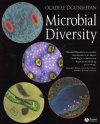Textbook
Out of Print
By: Oladele Ogunseitan
292 pages, Illus, b/w & col photos, figs, tabs
![Microbial Diversity Microbial Diversity]()
Click to have a closer look
About this book
Contents
Biography
Related titles
About this book
This book offers the first comprehensive, in-depth treatment of microbial diversity for undergraduate and graduate students. Using a global approach, Microbial Diversity illustrates the impact of microorganisms on ecological and Earth system phenomena.
Uses key ecological and global phenomena to show the continuity of microbial contribution.
Illustrates the importance of microbial diversity for the understanding of global physiochemical and biological processes.
Presents analyses of microscopic, culture, molecular, and phylogenetic systematic methods.
Shows the relevance of microbial diversity to global environmental problems, such as climate change and ozone depletion.
Features numerous illustrations, including over 60 4-color photographs of microbes.
Accompanied by a devoted website with resources for both instructors and students: www.blackwellpublishing.com/ogunseitan
Contents
Section I: Concepts and Methods:
1. The Concept of Microbial Species
2. Microscopic Methods
3. Culture Methods
4. Molecular and Genomic Methods
5. Phylogenetic Analysis
Section II: Principles and Applications:
6. Environmental Evolution
7. Biogeochemical Cycling of Carbon and Nitrogen
8. Biogeochemical Cycling of Phosphorus, Sulfur, Metals, and Trace Elements
9. Cross Species Interactions Among Prokaryotes
10. Interactions Between Prokaryotes and Eukaryotes
11. Microbial Diversity and Global Environmental Issues
Glossary of Terms
References
Index
Customer Reviews
Biography
Oladele Ogunseitan is Professor of Environmental Health, Science, and Policy at the University of California, Irvine. He has been a Global Environmental Assessment Fellow at Harvard University, and a Macy Foundation Fellow at the Marine Biological Laboratory in Woods Hole, Massachusetts.
Textbook
Out of Print
By: Oladele Ogunseitan
292 pages, Illus, b/w & col photos, figs, tabs
A thorough read of Microbial Diversity will alter our world view ... The fundamental lesson of this book turns our cultural myths inside out ... In Ogunseitan's learned tome the crucial importance of bacterial life to our environment is laid bare at a sobering level of scholarship. From the Foreword by Lynn Margulis, University of Massachusetts Microbial Diversity is an excellent work, dealing well with a paradox that is well known within microbial ecology: we are aware of how much we don't know. The real strength of Ogunseitan's book is that it accounts brilliantly for what we do know. The book reviews diverse fields, from bioinformatics to environmental engineering, and each is dealt with thoroughly and accurately. Few books are available that highlight the importance of microbes in every aspect of global processes; this book is definitely one of them. The text will be ideally suited to both under- and post-graduate students studying microbiology. Society for General Microbiology "Microbial Diversity is an excellent introduction to its subject, heralding a revolution now begun in microbiology and ecology." Edward O. Wilson, University Professor Emeritus, Harvard University "Microbial Diversity is a text that has been needed for years. The scholarly approach to this exciting and current topic by Oladele Ogunseitan fills a real void in the microbiological literature and will be appreciated by students and professional scientists, both in academia and industry. Get ready for an exciting ride into what most people consider the microbiological unknown." Arnold Demain, MIT Rise Fellow, Drew University "Dramatic advances in molecular biology, bioinformatics, ecology and environmental engineering have left an indelible mark on today's microbiology. This book utilizes the influx of these fields to guide readers through the most relevant topics of modern microbiology, providing the solid background information needed to appreciate microbial diversity." Christoph Tebbe, Federal Agricultural Research Centre and University of Braunschweig "...a good read, and a thorough itnroduction to a complex topic." Bioscience, December 2005 Ogunseitan aptly conveys the study of microbial diversity as an exciting intersection of molecular biology, biochemistry, ecology, and environmental science. In particular, he highlights the connections between microbial diversity and global environmental processes ... The text provides ample inspiration for professors to develop specific topics more thoroughly in the classroom." The Quarterly Review of Biology



































